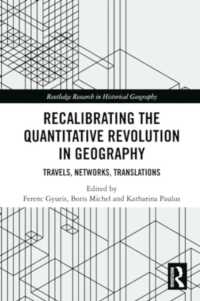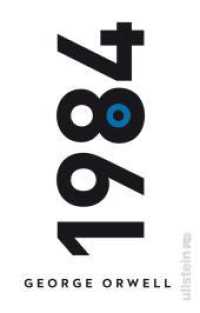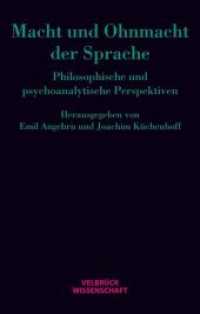- ホーム
- > 洋書
- > ドイツ書
- > Humanities, Arts & Music
- > Philosophy
- > antiquity
Description
Der seinsgeschichtliche Wandel der Unverborgenheit wird in dieser Vorlesung zusammen mit dem Wandel ihres Gegenwesens, der Verborgenheit (Lethe) gesehen (pseudos, falsum, Unrichtigkeit, Falschheit). Der letzte Mythos von der Lethe wird anhand der Politeia der Polis (Platon) gedacht. Der todesträchtige Gang des Menschen im Pol der Anwesenheit des Seienden, der Polis, führt zur Frage nach der Anwesung des Seienden nach dem Tode im Feld der entziehenden Verbergung, darüber hinaus zur Frage nach dem griechisch verstandenen Götterwesen. Zentral ist dabei der "Blick" (thea) als solcher, der Blick der Götter, sowie das Erscheinen des Ungeheuren im Geheuren im Blick des Menschen. Die Vorlesung schließt mit einer Weisung des übersetzenden Wortes Aletheia, über das Offene und das Freie der Lichtung des Seins, und der Fahrt des Denkers zum Haus der Göttin (thea).In this lecture, the being-historical change of unconcealment is contemplated together with the change of its counterpart, concealment (Lethe) (pseudo, falsum, incorrectness, falsehood). The last myth of Lethe is based on the "politeia" of the "polis" (Plato). The mortal passage of man in the realm of the presence of beings, the "polis", leads to the question of the presence of beings after death in the field of withdrawing concealment, and beyond that to the question of the god-being as it was taken in Grecian thinking. Central to this is the "gaze" ("thea") as such, the gaze of the gods, as well as the appearance of the uncanny in the cannyness of the gaze of man. The lecture closes with an instruction of the translating word "aletheia", about the open and free realm of the clearing of being, and the thinker´s journey to the house of the goddess ("thea").







